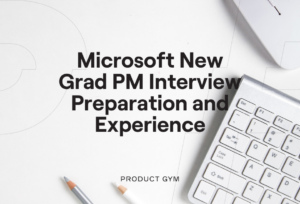Enterprise giant Salesforce is probably on many product managers’ “dream companies to work for” list. No matter what industry you’re in, you’ve almost certainly come across Salesforce’s best-in-class customer relationship management (CRM) platform. Maybe you’ve even used it yourself! Here’s everything you need to know about getting a PM job at this global organization.
Company Overview
Salesforce is a software-as-a-service (SaaS) company that offers access to its cloud-based products via a subscription. The company’s customer base spans a wide variety of industries, from tech and software to healthcare and manufacturing. Its flagship CRM (customer relationship management) product is the most-used CRM in the world.
Currently, Salesforce is a publicly-traded company (NYSE: CRM) with over 49,000 employees. The organization is headquartered in San Francisco, CA at the Salesforce Tower and is headed by CEO Marc Benioff, one of the original co-founders. He and Parker Harris, Dave Moellenhoff, and Frank Dominguez started the company in 1999, working out of a one-bedroom rental. A year later, salesforce.com officially launched, and by the end of 2001, the company had expanded globally and reached $22.4M in revenue.
On June 22, 2004, Salesforce officially went public on the NYSE. Just a few years later, in 2008, it became the first cloud-computing company in history to hit over $1B in revenue. The company’s customer base continued to grow as they launched new products, including Service Cloud and Chatter, and in 2012, Gartner named Salesforce the world’s #1 CRM, a title it still holds in 2020.
Over its nearly 21-year history, Salesforce has acquired 66 companies. Some notable examples include Tableau, Pardot, Radian6, and of course, Slack. The company’s annual revenue is now over $17B, and their customer base includes more than 150,000 organizations across the globe. Beyond their world-class CRM product, Salesforce is known for its strong corporate culture (more on that below) and commitment to volunteer work and philanthropy, especially during the COVID-19 pandemic.
Product Culture at Salesforce
Salesforce’s product portfolio encompasses a wide range of tools for sales, customer success, marketing, engineering, and more. However, even 21 years later, the company’s main product line is its first one: the Salesforce CRM platform. Since its launch, the team has made a number of improvements and additions to this product, which is now known as the Customer 360 and includes solutions for every stage of the customer lifecycle. Some of the most noteworthy are the Einstein AI, which automates follow-up tasks, and Mulesoft, which integrates data from multiple systems into Salesforce.
Aspiring Salesforce product managers should have at least a cursory understanding of the organization’s main product areas, which can be found on their corporate site. In addition, they should know a bit about Salesforce culture and more specially, the culture on the product team.
Overall Company Culture
At the center of Salesforce’s corporate culture is the “Ohana” philosophy. In Hawaiian, Ohana means “intentional family,” and that’s how the company thinks of its team. The Ohana mindset is made up of four core values: trust, customer success, innovation, and equality. At Salesforce, these values guide how they interact with and serve employees, customers, investors, and the community.
In addition, Salesforce wants to empower people (and not just their employees) to become “Trailblazers” through their technology. Their Trailhead product helps individuals build up their in-demand software and data skills, no matter their current employer or level of expertise. Users can follow guided “Trails,” or learning tracks, earn certifications, interact with Salesforce experts, and more.
Product Team Culture
Salesforce’s product team members are expected to be highly collaborative and ready to work across various teams and external stakeholders, including customers, executives, engineers, and partners. Innovation is a key part of the role, from coming up with new product ideas to building clear and compelling roadmaps that integrate various components from multiple sources. The product team culture also emphasizes seeing a project through from initial idea to shipment to customers.
What Does a Typical Salesforce PM Job Posting Look Like?
Since Salesforce offers a huge range of products and platforms, no two PM job postings are alike. Some, like this Senior PM, Threat & Vulnerability opening, require highly specific and technical skills, while others (this one, for example) require more of a generalist. And still, others are focused on one particular subdivision or brand, like Tableau or Einstein.
In general, however, a Salesforce PM needs to have the following skills. On the technical side, PMs must have:
- At least some experience managing SaaS or digital products
- The ability to document acceptance criteria and create user stories
- Expertise in web technologies and user behavior
- A strong understanding of user research, roadmapping, and product strategy
- Experience with user behavior analysis and associated tools
As far as “soft” skills go, Salesforce product managers should be:
- Comfortable with collaboration across different teams and stakeholders
- Adept communicators
- Strong multi-taskers
- Curious and creative
- Highly attentive to detail
How Do You Get an Interview at Salesforce?
The easiest way to get an interview at Salesforce is to create a stand-out job application. To search for and apply for a PM position at Salesforce, visit either their corporate careers page, Linkedin profile, or job posting boards like Glassdoor and Indeed. But before you hit the “submit application” button, make sure you’ve completed the steps below.
Write a Product Manager Resume
Typically, your resume is the first thing a hiring manager will look at, so you need to put your best foot forward. A well-crafted and tailored resume can determine whether or not you secure an initial interview. When putting together your product manager resume, carefully note the requirements and responsibilities highlighted in the job description and make sure to include those keywords.. Regardless of what background you’re coming from, the job will likely require you to have experience with at least three of the functions highlighted in the section above. If you can demonstrate results in those areas from your past experiences, be sure to include those.
Also, check our resume writing guide to crafting a winning product manager resume that works for a wide variety of product manager positions. Stop trying to customize it on your own — let us help.
Prepare Your Pitch and Position Yourself as the Ultimate PM
After you’ve created and proofread your resume, the next step is to position yourself in the best possible light as a PM. This will require you to make a winning pitch that highlights the product manager role’s significant functions and requirements. Here’s how to do it.
Apply!
However, sometimes submitting your application isn’t enough to secure an interview. You may have to network with former colleagues, acquaintances, or outside parties to get that first call. In addition, you should make use of our step-by-step recruiter networking methods to get your foot in the door.
What Is the Interview Process and Timeline?
The company page for Salesforce on Glassdoor is a fantastic resource if you’d like to learn more about the interview process for PM roles. Overall, 77% of interviewees said they had a positive experience, and the average interview difficulty was rated as 3.2 out of 5.
Based on a more thorough analysis of the PM interview entries, it appears that the overall time period from the initial call to offer varies significantly, but tends to take longer than two weeks (with some taking 2+ months). With this long of a timeline, it’s not surprising that the process is quite involved. Here is the general breakdown:
- Initial call with recruiter
- Call with hiring manager
- One-on-one interviews with team members
- Project presentation/final round with panel of stakeholders
- The offer!
How to Win the Introductory Call With the Hiring Manager
The goal here is to prove you’re qualified enough to move on to the next round. In general, the questions in this round are mostly behavioral and aimed at assessing culture fit. Along with the typical job interview questions, like “Tell me about yourself” and “What are your biggest strengths and weaknesses?” you’ll need to be prepared for more product- and company-specific questions.
According to Glassdoor, these are a few of the questions you should be ready to answer in the introductory call with the hiring manager:
- What have you worked on that you enjoyed and are proud of?
- What’s your favorite product and why?
- Give an example of how you improved a product management process.
- How would you improve an existing product?
- Why do you want to work at Salesforce?
During this introductory call, you’ll need to be prepared to discuss your resume and what you learned from your previous roles. If you’re leaving your current role, you’ll be asked why. Also, be sure to do your research on Salesforce and its various product lines, as well as the company culture. If you can tie specific past accomplishments to specific requirements listed in the job description, definitely do so. You want to make it clear that you can do the job, and the best way to do that is to show that you’ve done it before!
How to Win the Technical Rounds With the Hiring Manager and Team Stakeholders
Once you pass the initial call with the hiring manager, you’ll be invited to take part in more in-depth interviews with the people you’d be working with. For this round, be prepared to answer more technical and specific questions, plus a few “out of the box” ones. Specifically, you’ll likely be asked the following:
- Design an AI-based application in a store that would help customers check out clothes and try them on.
- How would you integrate video into Chatter?
- Tell me about a SaaS product you really like using.
- How many coffee shops are there in San Francisco?
- How do you prioritize requirements?
- How would you prepare a one month projection of a newly opened Ikea store for the company CEO?
- Tell me about a time when you didn’t get along with a coworker. How did you deal with it?
Since you’ll be meeting with several team members during this interview, you may want to tailor your responses to the person asking the question and their particular role. Also, you should be ready to talk about your experience working with different teams, especially engineering.
How to Win the Panel Presentation
Several of the Glassdoor interview descriptions mentioned that the final interview round consisted of a homework assignment and subsequent presentation. Based on the responses, this would most likely require you to present a product idea to a group of stakeholders and explain your thinking behind the strategy. One individual described it as “effectively a product proposal – what features would you build, how would you prioritize, write user stories, build a mock / prototype, roadmap etc…1hr presentation to various stakeholders (design, product, eng, etc).”
Since you’ll be given time to prepare before giving the presentation, practice in front of a friend, family member, or colleague. Get their feedback on your thought process, speaking style, and how to respond to any questions that might get raised.
How Did COVID-19 Change Hiring?
The COVID-19 pandemic has changed the way people are being hired today since offices are closed and on-sites are no longer possible. As a result, many companies are now making the shift to virtual interviews. Salesforce is no exception. Currently, all of their interviews are being held over video, including group interviews and panel presentations.
In spite of the pandemic, Salesforce is continuing to do well financially, with their stock up over 9% as of this writing. According to their Linkedin profile, Salesforce is ranked #4 among Linkedin’s top companies, and they are certainly still hiring. Right now, they have more than 5,000 positions open, with nearly 500 of those in the products and technology category.
Unsure about interviewing virtually? Don’t worry — we can help. We know that while the expectations are identical, virtual interviews differ significantly from in-person ones. Check out the Product Gym guide to dominating your virtual interviews.
Want to learn more about landing product manager jobs at top tech companies? Schedule a free consultation with us today.



